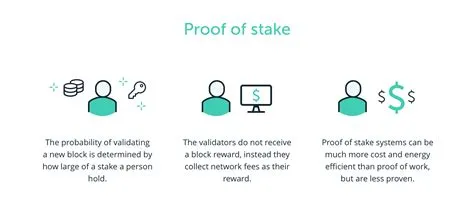
Proof of Stake (PoS) is a consensus algorithm used by some blockchain networks to validate transactions and create new blocks in the blockchain. In PoS, the creator of the next block is chosen based on their stake or ownership of the network's cryptocurrency, rather than on their computational power or mining equipment.
To participate in PoS, users must own a certain amount of the network's cryptocurrency and hold it in a special wallet, called a staking wallet. By staking their cryptocurrency, users are essentially locking it up as collateral, which incentivizes them to act in the best interest of the network. In return for staking, users may receive rewards in the form of additional cryptocurrency.
When a new block is to be added to the blockchain, the network randomly selects a staker to validate the transactions and create the new block. The probability of being chosen as the next validator is proportional to the amount of cryptocurrency the staker has staked. This means that the more cryptocurrency a staker has staked, the greater the chance they have of being chosen as the next validator.
Once a staker has been selected to create a block, they are responsible for verifying the transactions in the block and adding it to the blockchain. In order to prevent malicious behavior, the staker must also put up a security deposit, which they will forfeit if they act against the best interest of the network. This security deposit incentivizes stakers to act honestly and penalizes them for acting maliciously.
PoS has several advantages over other consensus algorithms, such as proof of work (PoW). First, PoS is more energy-efficient than PoW, as it does not require massive amounts of computational power to validate transactions and create new blocks. This makes it a more environmentally-friendly alternative to PoW.
Second, PoS is less susceptible to centralization than PoW, as it does not reward those with the most mining equipment or computational power. Instead, PoS rewards those who have the most stake in the network, which aligns the interests of the validators with the interests of the network.
In conclusion, Proof of Stake is a consensus algorithm used in blockchain networks that leverages the staking of cryptocurrencies as collateral to validate transactions and create new blocks. By doing so, PoS provides a more energy-efficient and decentralized alternative to PoW, which relies on computational power. PoS incentivizes honest behavior and penalizes malicious behavior through a security deposit. Its advantages over PoW include environmental-friendliness and reduced centralization.